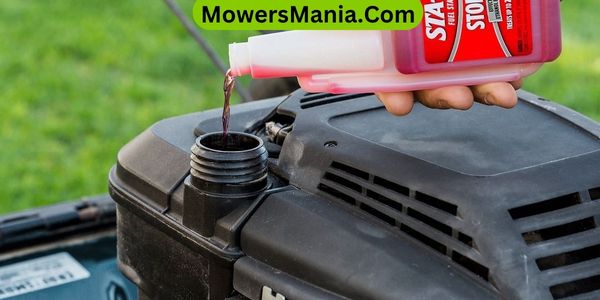You may be thinking that fuel stabilizers are only for gasoline engines, but the truth is, they can also benefit diesel lawn mowers. While it may seem counterintuitive, using a fuel stabilizer in your diesel lawn mower can actually help improve its performance and longevity.
But before you pour any old stabilizer into your tank, there are a few important considerations to keep in mind.

Understanding the specific benefits and proper application of fuel stabilizers in diesel lawn mowers can make a significant difference in the maintenance and storage of your equipment.
So, let’s explore the potential advantages and best practices for using a fuel stabilizer in your diesel lawn mower.
Benefits of Using a Fuel Stabilizer
Using a fuel stabilizer in your diesel lawn mower can help prevent fuel degradation and maintain engine performance during periods of storage.
When you store your mower for an extended period, the fuel can deteriorate, leading to starting issues and potential damage to the engine.
By adding a fuel stabilizer, you can extend the life of the fuel and ensure that it burns cleanly when you start the mower up again.
This not only saves you from the frustration of dealing with a stubborn engine but also saves you money on potential repairs or replacements.
In addition to preserving the fuel, a stabilizer also helps prevent corrosion within the fuel system. Diesel fuel is prone to attracting water, which can lead to rust and other forms of corrosion in the tank and fuel lines.
A fuel stabilizer contains corrosion inhibitors that protect the metal components, keeping your mower’s fuel system in good condition.
Choosing the Right Fuel Stabilizer
To ensure the preservation of your diesel lawn mower’s fuel and the prevention of corrosion in its fuel system, selecting the right fuel stabilizer is crucial.
When choosing a fuel stabilizer for your diesel lawn mower, consider the following factors to make an informed decision:
- Compatibility: Ensure the fuel stabilizer is specifically designed for diesel engines. Using a stabilizer meant for gasoline engines may not provide the necessary protection for your diesel mower.
- Corrosion Prevention: Look for a stabilizer that offers corrosion prevention properties. Diesel fuel is prone to attracting water, which can lead to corrosion in the fuel system. A good stabilizer will address this issue.
- Long-Term Storage: If you plan on storing your diesel lawn mower for an extended period, choose a stabilizer that’s effective for long-term storage. This will help keep the fuel fresh and prevent any deterioration during periods of inactivity.
- Cleaning Properties: Opt for a fuel stabilizer that also includes cleaning properties. This can help remove any existing deposits or contaminants in the fuel system, ensuring optimal engine performance.
Considering these factors will help you select a fuel stabilizer that not only preserves the quality of your diesel fuel but also maintains the overall health of your lawn mower’s engine.
Proper Application of Fuel Stabilizer

When storing your diesel lawn mower, it’s important to choose the right fuel stabilizer and add it to the fuel tank.
By carefully following the manufacturer’s instructions, you can ensure that the stabilizer is properly applied and effectively protects your mower’s engine during storage.
Take the time to select a high-quality stabilizer and apply it correctly to keep your mower in top condition.
Storing the Mower
Consider adding a fuel stabilizer to the diesel in your lawn mower before storing it for an extended period. This simple step can help prevent fuel degradation and ensure your mower starts up smoothly when you’re ready to use it again.
Here are four reasons why using a fuel stabilizer when storing your diesel lawn mower can make a significant difference:
- Peace of Mind: Knowing that your fuel is being protected from degradation can alleviate any worries about starting your mower after a long period of storage.
- Longevity: Fuel stabilizers help maintain the quality of the diesel, potentially extending the lifespan of your lawn mower.
- Time-Saving: By using a stabilizer, you can avoid the hassle of dealing with clogged fuel lines or carburetor issues down the line.
- Cost-Effective: Investing in a fuel stabilizer now can save you from costly repairs in the future.
Taking this precaution can make a noticeable difference in the performance and longevity of your diesel lawn mower.
Choosing the Stabilizer
Select a fuel stabilizer that’s specifically formulated for diesel engines to ensure effective preservation during storage.
Look for stabilizers designed to prevent the formation of gums and varnish in diesel fuel, as these can clog the fuel system and cause starting issues.
It’s important to choose a stabilizer that also contains corrosion inhibitors to protect metal components within the fuel system.
Additionally, opt for a stabilizer with a long-lasting formula to ensure that the fuel remains stable during extended periods of storage.
Consider reading user reviews and consulting with a lawn mower expert to find a stabilizer that has proven effectiveness in preserving diesel fuel.
Adding the Stabilizer
To ensure effective preservation of your diesel fuel during storage, add the stabilizer directly to the fuel tank following the manufacturer’s recommended dosage.
Here are four crucial steps to properly add the stabilizer and protect your diesel lawn mower:
- Fill-Up: Before adding the stabilizer, fill the fuel tank to its maximum capacity to minimize the air and moisture inside, ensuring better mixing of the stabilizer with the fuel.
- Measure Carefully: Accurately measure the recommended amount of stabilizer using a dedicated measuring cup or device to avoid over or under-treating the fuel.
- Mix Thoroughly: After adding the stabilizer, run the engine for a few minutes to ensure the treated fuel circulates through the system, protecting all vital components.
- Seal Tight: Securely close the fuel tank to prevent air and moisture from contaminating the treated fuel, maintaining its stability during storage.
Maintenance Tips for Diesel Lawn Mowers
Regular maintenance is essential for keeping your diesel lawn mower running smoothly and efficiently.
Firstly, it’s crucial to change the oil regularly according to the manufacturer’s recommendations. Fresh oil ensures that the engine remains properly lubricated, reducing wear and extending its lifespan.
Additionally, clean or replace the air filter as needed to prevent debris from clogging the engine and hindering performance.
Maintaining sharp blades is equally important for a clean cut and overall lawn health. Periodically inspect the blades for damage and sharpen or replace them as necessary.
Moreover, check the fuel system for any signs of leaks and ensure that the fuel filter is clean and free from debris.
It’s also vital to keep an eye on the cooling system, ensuring that the radiator is clean and the cooling fins are free from dirt and debris.
Lastly, don’t forget to inspect the battery and electrical system, tightening any loose connections and keeping the battery charged.
Long-Term Storage Considerations
When storing your diesel lawn mower for an extended period, it’s crucial to consider the duration of storage, the quality of the fuel, and the maintenance needs.
Ensuring that the mower is properly prepared for long-term storage will help prevent fuel degradation and potential engine issues.
Storage Duration
Consider using a fuel stabilizer when storing your diesel lawn mower for an extended period to prevent fuel degradation and maintain optimal engine performance.
When considering the storage duration of your diesel lawn mower, keep in mind the following points:
- Long-term storage without a fuel stabilizer can lead to fuel degradation and gum formation, causing starting issues and poor engine performance.
- Extended periods of inactivity can result in corrosion and rust formation in the fuel system and engine components, leading to costly repairs.
- Storing the mower with untreated fuel for more than 30 days can lead to clogged fuel lines and carburetor issues, affecting the engine’s reliability.
- Using a fuel stabilizer can help preserve the fuel quality and prevent moisture accumulation, ensuring a smoother start and reliable operation when the mower is needed again.
Fuel Quality
To maintain optimal fuel quality during long-term storage of your diesel lawn mower, consider using a high-quality fuel stabilizer specifically designed for diesel engines.
Diesel fuel can degrade over time, leading to issues such as clogged fuel filters and injector problems. A fuel stabilizer helps prevent fuel oxidation and the formation of gum and varnish in the fuel system.
When selecting a stabilizer, look for one that contains antioxidants and corrosion inhibitors to protect the fuel system components. It’s important to follow the manufacturer’s recommendations for the correct dosage and mixing procedure.
Additionally, before adding the stabilizer, ensure the fuel tank is nearly full to minimize the potential for condensation.
Maintenance Needs
Monitoring the fuel quality closely becomes essential as you address the maintenance needs, particularly when considering long-term storage for your diesel lawn mower.
In order to ensure that your mower remains in good condition during extended periods of non-use, there are several important maintenance considerations to keep in mind:
- Regularly inspect and clean the air filter to prevent debris buildup and ensure proper airflow.
- Change the oil at recommended intervals to maintain optimal engine lubrication.
- Add a fuel stabilizer to the tank before long-term storage to prevent fuel degradation and keep the engine running smoothly.
- Store the lawn mower in a dry, covered area to protect it from the elements and minimize the risk of rust or corrosion.
Common Misconceptions About Fuel Stabilizers

Many people mistakenly believe that fuel stabilizers are only necessary for long-term storage of diesel lawn mowers. However, this is a common misconception. Fuel stabilizers are beneficial for all diesel engines, including lawn mowers, regardless of storage duration.
One prevalent myth is that fuel stabilizers are only useful if you don’t plan to use your mower for an extended period.
In reality, fuel stabilizers serve a crucial purpose in preventing fuel degradation, which can occur even during short-term storage or when the mower is regularly used.
Contrary to popular belief, fuel can begin to deteriorate in as little as 30 days, leading to issues such as clogged fuel lines and carburetor problems.
Another misconception is that fuel stabilizers are only necessary for older engines. This isn’t true; both new and old diesel lawn mowers can benefit from the use of fuel stabilizers.
By treating the fuel with a stabilizer, you can ensure optimal engine performance, prevent corrosion, and avoid costly repairs.
It’s important to understand that the benefits of using a fuel stabilizer extend beyond long-term storage and apply to the overall maintenance and performance of your diesel lawn mower.
Frequently Asked Questions [FAQs]
Can I Use a Fuel Stabilizer in a Diesel Lawn Mower That Is Also Equipped With a Fuel Filter Heater?
You can use a fuel stabilizer in a diesel lawn mower with a fuel filter heater. It helps prevent fuel degradation, water accumulation, and clogging, ensuring smooth engine operation and easier starts, especially after the mower has been sitting idle.
Will Using a Fuel Stabilizer in My Diesel Lawn Mower Affect Its Warranty or Manufacturer’s Recommendations?
Using a fuel stabilizer in your diesel lawn mower shouldn’t affect the warranty or manufacturer’s recommendations, as long as you follow the guidelines for the specific stabilizer and your mower’s maintenance requirements.
Are There Any Specific Brands or Types of Fuel Stabilizers That Are Not Suitable for Use in Diesel Lawn Mowers?
Yes, there are specific brands or types of fuel stabilizers that are not suitable for use in diesel lawn mowers. Always check the product label to ensure it’s compatible with diesel engines before using.
Can I Use a Higher or Lower Concentration of Fuel Stabilizer in My Diesel Lawn Mower Than What Is Recommended for Gasoline-Powered Lawn Mowers?
You should use the recommended concentration of fuel stabilizer in your diesel lawn mower. Using a higher or lower concentration than what’s advised for gasoline-powered mowers might affect the performance and efficiency of your diesel engine.
Will Using a Fuel Stabilizer in My Diesel Lawn Mower Have Any Impact on the Emissions or Environmental Impact of the Mower?
Using a fuel stabilizer in your diesel lawn mower can help maintain fuel quality and prevent issues with starting and performance. It can also reduce emissions and environmental impact by ensuring efficient combustion.
Conclusion
So, can you use a fuel stabilizer in a diesel lawn mower? Absolutely! Using a fuel stabilizer can help prevent fuel degradation, corrosion, and engine performance issues.
Just make sure to choose the right stabilizer for diesel engines, follow proper application guidelines, and consider long-term storage considerations. With the right maintenance and care, your diesel lawn mower can continue to run smoothly and efficiently.



